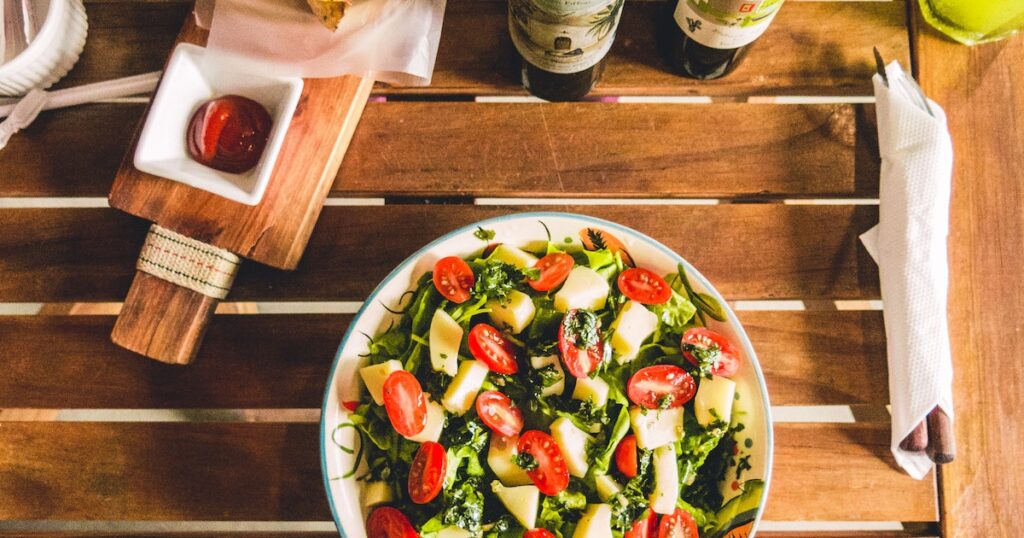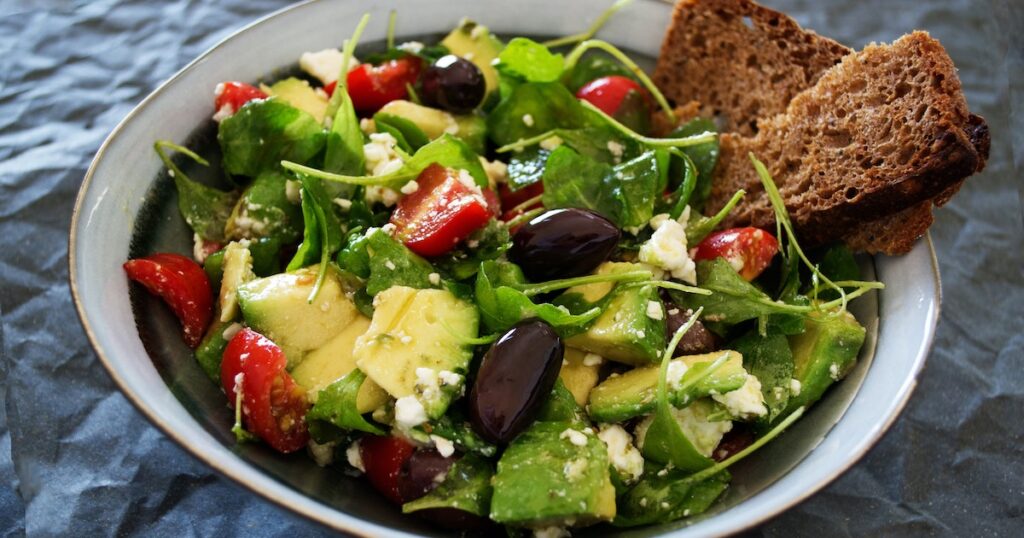In a time when diets and weight loss are so popular, people are always looking for easy and quick ways to improve their health. From all the diet trends that come and go, the Mediterranean Green Diet has stood the test of time and has been shown to work. It’s not just a passing trend; it’s a cutting-edge, scientifically proven way to improve health and the environment.

What Is the Green Mediterranean Diet?
Instead of starving yourself, the plan stresses eating colorful, tasty, healthy food. The goal of the Mediterranean Green Diet is to eat well and healthily while still having delicious food.
It is a version of the traditional Mediterranean diet that focuses on veggies, fish, olive oil, and almonds instead of meat. Polyphenols, found in large amounts in plants and act as antioxidants, are another health benefit.
If you want to improve your health even more, the green form of the Mediterranean diet maybe even better. It can help lower visceral cholesterol, control blood pressure, and reduce inflammation.
Why or why not a green Mediterranean diet might help you lose weight?
Due to the deficient number of calories, the diet focuses on healthy foods and avoids processed meals. It shouldn’t be a surprise that the Mediterranean diet might help you lose weight.
Eight studies in 2021 showed that people who followed the Green Mediterranean Diet lost an average of 14 pounds (6.3 kg) after six months. Because this diet has more antioxidants and less red meat, it might be better at eliminating belly fat than other Mediterranean diets.
Nonetheless, more research is needed to determine how certain polyphenol-rich foods affect belly fat.

What to Accept and What Not to Accept
Foods to Enjoy:
- Lots different fruits, like oranges, pears, apples, berries, grapes, and more, contain vitamins and antioxidants.
- Greens: broccoli or cauliflower, spinach, carrots, kale, peppers, and much more. This guarantees a good source of essential nutrients.
- Complete Grains: Whole wheat bread, oats, barley, quinoa, and brown rice are all good sources of fiber and complex carbs.
- Edamame, tofu, chickpeas, tempeh, beans, and lentils are all legumes, which are plant-based foods high in protein and fiber.
- Nuts and seeds: sunflower, pecan, walnut, and almond seeds. Flax and chia seeds contain healthy fats that are good for your heart and give you essential nutrients.
- Olive oil is the central fat used for cooking and salad sauce. It is full of antioxidants and monounsaturated fats.
- Omega-3 fatty acids and protein can be found in fish.
- Tuna
- Fish
- Cheese and yogurt both have calcium and good bacteria called probiotics.
- Green tea has polyphenols and antioxidants that are good for your health and energy.
- One of-a-kind plant-based protein source that is high in omega-3 fatty acids is duckweed.
Things you should not eat:
- Red meat includes beef, pork, lamb, and other types of red meat. Meats from birds, like chicken, turkey, duck, and others.
- Meats that have been processed, like bacon, gammon, sausage, salami, and more.
- Ice cream, butter, milk, and cream are all dairy products (except cheese and yogurt).
- Sweets like chocolate, cookies, cakes, pies, and candy.
- Simple carbs like white bread, rice, pasta, cereals, and others are processed.
- Honey (an added sugar)
- Sugar maple syrup
- agave syrup
- Sweeteners made in a lab: Sucralose, aspartame, and saccharin
- Fried foods, like French fries and tasty deep-fried treats.
- Fast Food: burgers and other quick meals.
- Alcohol: beer and other boozy drinks.

An Example
Fry some salmon and serve it with roasted veggies for a healthy meal. They give you fiber, omega-3s, protein from the fish, and phytochemicals that fight inflammation from the root veggies. The green Mediterranean Diet blends traditional Mediterranean flavors with a modern interest in eating fresh foods that are good for the environment.
Pros and cons of the green Mediterranean diet
Pros
- According to research, people who follow this diet plan for at least six months have lower blood pressure and LDL cholesterol levels than people who follow a traditional Mediterranean diet.
- Less insulin resistance and lower amounts of C-reactive protein, a protein that shows how inflamed your body is.
- Significant reduction in the size of the waist. Unfortunately, this drop was only seen in men, so more research is needed to determine if it also affects waist circumference reduction in women.
- People who followed the standard Mediterranean diet lost much more belly fat than those who didn’t. Heart disease, type 2 diabetes, and breast cancer are all more likely to happen if you have a lot of belly fat.
- Along with being good for your health, a green Mediterranean diet has many promises to improve the planet’s health. Individuals can drastically cut their meat consumption by about 35% to reduce their effect on greenhouse gas emissions.
Cons
- Foods high in plants, like those in the green Mediterranean diet, are better for your health than red meat and processed foods. Still, sticking to it for a long time can be challenging, even though that’s when the best results are seen.
- A lot of people are allergic to tree nuts. Sticking to the green Mediterranean diet can be challenging if you’re allergic to nuts.
- People who are iron-reliant, like vegetarians, may be able to go the extra mile without eating red meat. Still, if they plan, they can ensure they get all the iron they need from other things.
- Some things, like duckweed, walnuts, and seafood, can be pricey. It might take more work to make meals and eat less red meat, dairy, and sweets, which could be hard for some people.
Note
A 2020 study found three benefits of the green Mediterranean diet, but its small sample size and short duration raise questions about its reliability. More research with larger groups and longer durations is needed to ensure the diet’s effectiveness in reducing heart disease and stroke risk. Confounding factors like exercise, smoking, alcohol consumption, and genetics need to be considered. The cost-effectiveness and usefulness of the diet should also be considered.

Would you like to try the Green Mediterranean Diet?
The green Mediterranean diet is healthy and good for the environment. But before starting any new diet, especially if you have a health problem or an allergy, you should talk to your doctor or a trained chef. Eating in a way that makes you feel good would be best.
Here are some valuable tips:
- Take small steps at first. You don’t have to stick to the green Mediterranean diet initially. You can change your diet by eating fewer animal products and more plant-based foods.
- Try out new dishes. You can make walnuts, green tea, and Mankai (duckweed), which taste great. You can get some ideas from recipes or the web. Adding herbs, spices, lemon juice, vinegar, or olive oil to your food is another way to make it taste better.
- Be flexible and valuable. The Mediterranean green diet is not a strict plan that you have to stick to. You can eat your favorite foods occasionally as long as you try to stay healthy.
- You can change the green Mediterranean diet to suit your tastes, wants, and way of life.
In short:
Foods that are low in calories and good for you, like veggies, olive oil, almonds, green tea, and fish, are part of the Green Mediterranean Diet. Having less belly fat, high blood pressure, and swelling are all helped by it. A study from 2021 found that following a diet can lower blood pressure, LDL cholesterol, and insulin resistance. Toxins and some foods, on the other hand, can make long-term achievement hard.
Disclaimer
If losing weight is your main goal, keep in mind that being your best self does not always mean losing weight (except for metabolic diseases and obesity), and there are many other ways to get healthy. A lot of other things in your life also have a big effect on your health. A healthy diet is always well-balanced and fits your lifestyle.
FAQs
Q.1 What’s the difference between the Mediterranean diet and the green Mediterranean diet?
Many people think of the green Mediterranean diet as a stricter version of the standard Mediterranean diet. It involves eating more plant-based foods and less animal products.
Q.2 How much weight do you think you’ll lose on the green Mediterranean diet?
The green Mediterranean diet may help you lose weight, but it will depend on your age, gender, level of exercise, and starting weight. It seems that the green Mediterranean diet may help people lose weight even more than the healthy or standard Mediterranean diet.
Q.3 Does the Mediterranean diet help you lose weight?
The green Mediterranean diet can help you lose weight because it is low in calories and heavy on healthy foods instead of processed ones.
Q.4 What kind of fat is most important in the Mediterranean diet?
A big part of the Mediterranean diet is olive oil, which is full of healthy monounsaturated fats. These fats help lower blood pressure and cholesterol, which is good for the heart.
Q.5 Is the Green Mediterranean diet better than exercise?
The Mediterranean diet is not better than exercise, it’s not even close. It’s just another thing you can do.

2 thoughts on “Green Mediterranean Diet: The Best and Fresh Approach to Weight Loss in 2024”